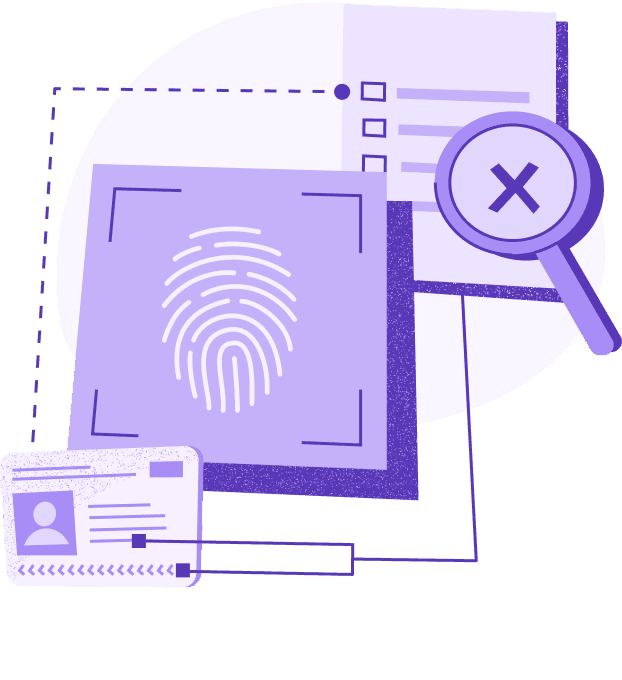Article
7 min read
A Guide to Employee Background Checks in Argentina
Employee background checks
Legal & compliance

Author
Michał Kowalewski
Last Update
September 05, 2025

Table of Contents
What employers need to know about background checks in Argentina
Are background checks legal in Argentina?
What types of background checks are illegal in Argentina?
Common background check industries
Types of background checks in Argentina
Background check mistakes to avoid in Argentina
Step-by-step guide of employee background checks in Argentina
Run employee background checks with Deel
Key takeaways
- Well-executed employment background checks ensure informed hiring through a detailed verification of employment history, education, criminal records, and more
- Employment background checks in Argentina must comply with the Personal Data Protection Law, which means obtaining written consent, collecting only relevant data, and maintaining the data's confidentiality and security
- Employers should take care with data retention and avoid discrimination and relying on inaccurate information during the background check process to avoid legal repercussions
Employee background checks should be a standard part of your recruitment process when looking to hire in Argentina. Although not mandatory, they are a common practice, especially in finance, healthcare, education and government agencies.
Pre-employment background checks not only help confirm the competencies of your job applicants, but also ensure a safe working environment.
Argentina is a hot spot for hiring with its rich pool of over 130,000 software engineers, time zone compatibility with North America, and plenty of English speakers. A smooth background check process can boost your hiring success in Argentina's talent-rich market.
In this article, you'll discover:
- How to run an effective and legal employment screening in Argentina
- Which checks are the most common
- What mistakes to avoid when performing a background check in Argentina
What employers need to know about background checks in Argentina
An employee background check is the process of verifying a potential hire’s work history, education, professional qualifications, and any criminal records they might have. It’s particularly beneficial to run before finalizing an employment offer or signing a contract, as it ensures the candidate meets the company's standards and requirements.
In Argentina, the primary legislation governing the collection and use of personal data is the Personal Data Protection Law (PDPL). This law, enacted in 2000, regulates the processing of personal data and aims to protect the fundamental rights of individuals. The Argentine Agency of Access to Public Information (AAIP) is the regulatory body responsible for overseeing compliance with the PDPL.
When conducting background checks in Argentina, it is crucial for employers to adhere to the PDPL. This includes obtaining consent from the candidate for conducting the background check, ensuring the accuracy and relevance of the information collected, and maintaining the confidentiality and security of the data. Additionally, any transfer of personal data to other countries must comply with the PDPL's requirements.
Are background checks legal in Argentina?
Background checks are legal in Argentina, provided they comply with the PDPL. However, there are a few considerations to keep in mind as an employer:
- The law emphasizes the importance of obtaining the candidate's consent before conducting any background check
- Employers must inform candidates about the purpose of the background check and the type of information that will be collected
- Transparency and consent are fundamental principles that guide the legality of background checks in Argentina
- Sensitive information, such as health records or religious beliefs, is protected under the PDPL
Background checks
What types of background checks are illegal in Argentina?
Under the PDPL, certain types of background checks that infringe upon individuals' privacy rights are considered illegal.
- Conducting credit checks without explicit consent or conducting extensive social media background checks without a clear job-related purpose may violate data protection law
- Unauthorized collection of sensitive data such as health records, sexual orientation, political affiliations, or religious beliefs
- Conducting credit checks without a valid reason related to the job position is prohibited
In Argentina, penalties for violating data protection laws can range from observations and fines to business closures or database cancellations. Specifically, fines can vary from AR $1,000 to AR $100,000, depending on the severity of the violation. For moderate infractions, fines can reach up to AR $3 million, severe violations up to AR $10 million, and very severe infractions up to AR $15 million.
Common background check industries
In Argentina, background checks are prevalent across various industries, including finance, healthcare, education, and government.
- Financial sector often conducts rigorous background checks due to the sensitive nature of its roles and the regulatory requirements
- Healthcare industry prioritizes comprehensive background checks to ensure patient safety and regulatory compliance
- Educational institutions and government agencies also place a strong emphasis on verifying the credentials, and backgrounds of potential employees to maintain the integrity of their institutions
Types of background checks in Argentina
In Argentina, effective employment screening covers essential aspects to evaluate a candidate's abilities. Knowing these areas helps employers tailor screening processes to meet job requirements and legal standards.
| Type of Check | Common in Argentina? | Reason |
|---|---|---|
| Employment History | Common | Validates work experience and reliability |
| Educational Qualifications | Common | Ensures academic credentials are legitimate |
| Criminal Records | Common | Assesses potential risks and legal compliance |
| Credit History | Less Common | Ensures the legitimacy of the candidate's educational background and qualifications |
| Social Media Screening | Less Common | Limited use due to privacy and data protection laws |
| Drug Testing | Less Common | Restricted by privacy laws and labor regulations |
Background check mistakes to avoid in Argentina
No matter if you’re hiring employees or contractors in Argentina, there are a few things that you shouldn’t do as an employer when it comes to background checks:
- Skipping consent: Failing to obtain explicit consent from candidates before conducting background checks violates the PDPL and can lead to legal consequences
- Mishandling sensitive data: Improper handling of sensitive personal data, such as health records or political affiliations, can result in severe penalties under the PDPL
- Neglecting transparency: Lack of transparency in communicating the purpose and scope of the background check to candidates can erode trust and lead to compliance issues
- Relying on unverified sources: Depending on unverified sources or informal channels for background information can compromise the accuracy and legality of the checks
- Ignoring Data Privacy Laws: Disregarding the stringent data privacy laws in Argentina can lead to legal liabilities and damage the employer's reputation
Compliance
Step-by-step guide of employee background checks in Argentina
Below is a list of steps that employers in Argentina should follow to ensure a legal and effective background checks:
- Obtain candidate consent: Before initiating a background check, obtain explicit consent from the candidate in writing, clearly outlining the purpose and scope of the check. Although it’s not specified in the law, written consent is recommended for documentation and compliance purposes
- Verify candidate identify: Determine the specific information to be verified, such as employment history, educational qualifications, and professional certifications
- Engage a professional background check provider: Consider partnering with a reputable background check provider with expertise in conducting checks in Argentina to ensure compliance with local laws and regulations
- Verify employment history: Validate the candidate's employment history, including positions held, duration of employment, and performance
- Authenticate educational qualifications: Confirm the candidate's academic credentials and degrees from relevant institutions
- Check professional licenses and certifications: Verify any professional licenses or certifications claimed by the candidate to ensure their authenticity
- Review criminal records: Conduct a criminal background check within the legal boundaries set by the PDPL to assess any criminal history
- Assess financial history: If relevant to the role, review the candidate's financial history, including creditworthiness, bankruptcy filings, and financial stability
- Respect data privacy: Ensure that all personal data collected during the background check process is handled with strict adherence to data privacy laws
- Communicate findings to candidates: After completing the background check, communicate the findings to the candidate in a transparent and respectful manner, allowing them the opportunity to address any discrepancies
With the requirement for a comprehensive background check for our contractors, I highly recommend Deel's background check add-on service for their unparalleled accuracy and efficiency. Deel not only streamlines the vetting process but also ensures a thorough examination of candidates, providing a reliable foundation for informed hiring decisions.
—Andrew Swaby,
CEO, ATS Investments Group
Run employee background checks with Deel
There’s no need for HR to log into yet another platform or manually chase documents. With screenings in over 200 countries and territories (and counting), for employees and contractors, you can manage background checks for global hires with a single source of truth without leaving the Deel platform.
Are you looking for an easy way to run a fast background check? Look no further, and let Deel take care of that for you.

Michał Kowalewski a writer and content manager with 7+ years of experience in digital marketing. He spent most of his professional career working in startups and tech industry. He's a big proponent of remote work considering it not just a professional preference but a lifestyle that enhances productivity and fosters a flexible work environment. He enjoys tackling topics of venture capital, equity, and startup finance.
















